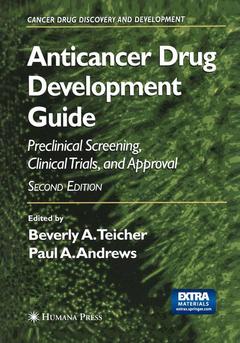Anticancer Drug Development Guide, Softcover reprint of the original 1st ed. 2004 Preclinical Screening, Clinical Trials, and Approval Cancer Drug Discovery and Development Series
Langue : Anglais
Coordonnateurs : Teicher Beverly A., Andrews Paul A.

This unique volume traces the critically important pathway by which a "molecule" becomes an "anticancer agent. " The recognition following World War I that the administration of toxic chemicals such as nitrogen mustards in a controlled manner could shrink malignant tumor masses for relatively substantial periods of time gave great impetus to the search for molecules that would be lethal to specific cancer cells. Weare still actively engaged in that search today. The question is how to discover these "anticancer" molecules. Anticancer Drug Development Guide: Preclinical Screening, Clinical Trials, and Approval, Second Edition describes the evolution to the present of preclinical screening methods. The National Cancer Institute's high-throughput, in vitro disease-specific screen with 60 or more human tumor cell lines is used to search for molecules with novel mechanisms of action or activity against specific phenotypes. The Human Tumor Colony-Forming Assay (HTCA) uses fresh tumor biopsies as sources of cells that more nearly resemble the human disease. There is no doubt that the greatest successes of traditional chemotherapy have been in the leukemias and lymphomas. Since the earliest widely used in vivo drug screening models were the murine L 1210 and P388 leukemias, the community came to assume that these murine tumor models were appropriate to the discovery of "antileukemia" agents, but that other tumor models would be needed to discover drugs active against solid tumors.
I: In Vitro Methods.- 1 High-Volume Screening.- 2 High-Throughput Screening in Industry.- 3 The NCI Human Tumor Cell Line (60-Cell) Screen: Concept, Implementation, and Applications.- 4 Human Tumor Screening.- II: In Vivo Methods.- 5 Murine L1210 and P388 Leukemias.- 6 In Vivo Methods for Screening and Preclinical Testing: Use of Rodent Solid Tumors for Drug Discovery.- 7 Human Tumor Xenograft Models in NCI Drug Development.- 8 NCI Specialized Procedures in Preclinical Drug Evaluations.- 9 Patient-Like Orthotopic Metastatic Models of Human Cancer.- 10 Preclinical Models for Combination Therapy.- 11 Models for Biomarkers and Minimal Residual Tumor.- 12 Spontaneously Occurring Tumors in Companion Animals As Models for Drug Development.- III: Nonclinical Testing to Support Human Trials.- 13 Nonclinical Testing: From Theory to Practice.- 14 Nonclinical Testing for Oncology Drug Products.- 15 Nonclinical Testing for Oncology Biologic Products.- IV: Clinical Testing.- 16 Working With the National Cancer Institute.- 17 Phase I Trial Design and Methodology for Anticancer Drugs.- 18 Phase II Trials: Conventional Design and Novel Strategies in the Era of Targeted Therapies.- 19 Drug Development in Europe: The Academic Perspective.- 20 The Phase III Clinical Cancer Trial.- 21 Assessing Tumor-Related Symptoms and Health-Related Quality of Life in Cancer Clinical Trials: A Regulatory Perspective.- 22 The Role of the Oncology Drug Advisory Committee in the FDA Review Process for Oncologic Products.- 23 FDA Role in Cancer Drug Development and Requirements for Approval.
Includes supplementary material: sn.pub/extras
Ouvrage de 451 p.
17.8x25.4 cm
Ouvrage de 451 p.
17.8x25.4 cm
Thèmes d’Anticancer Drug Development Guide :
Mots-clés :
cancer; cell; clinical trial; drug; drug development; drug discovery; leukemia; research; screening; tumor
© 2024 LAVOISIER S.A.S.



